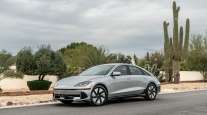VW to Cut Jobs, Costs in Transition to Electric, Autonomous Cars

Volkswagen AG’s main car brand plans to deepen cost cuts and ax more jobs as profits slip in the industry’s shift to electric and self-driving cars.
The German carmaker said March 13 it will eliminate as many as 7,000 positions — with measures including early retirement and not filling vacant positions — to achieve an annual profit gain of 5.9 billion euros starting in 2023.
“We will significantly step up the pace of our transformation so as to make Volkswagen fit for the electric and digital era,” VW brand Chief Operating Officer Ralf Brandstaetter said.
The VW car brand, which accounts for about half of the group’s global deliveries, employs about 185,000 workers out of a workforce of 650,000. VW has been pushing to rein in bloated expenses to lift profitability that is trailing rivals. Return on sales for VW’s namesake brand last year fell to 3.8% from 4.2% because of higher spending on future electric models and production bottlenecks triggered by stricter emission rules in Europe.

Volkswagen AG CEO Herbert Diess (Krisztian Bocsi/Bloomberg News)
Labor costs are a “big concern” that risk derailing a much needed streamlining of operations, Herbert Diess, CEO of VW, told investors March 12. Diess, who also heads the VW brand, has been axing slow-selling models and car variants to reduce complexity. Further measures will include lowering material costs and lifting productivity at its factories by 5% to achieve an operating profit margin of 6% in 2022.
Chief Financial Officer Arno Antlitz acknowledged that while the company has “higher goals” that reflect its superior scale compared with smaller, more profitable rivals such as PSA Group, VW was sticking to the 6% target “in the midterm” as the cost for the looming industry transformation weighs on earnings.
VW signed a labor pact in 2016 to cut 30,000 jobs worldwide and generate about 3 billion euros in annual savings. The brand has achieved 2.4 billion euros in savings so far and a net reduction of more than 6,300 positions, despite adding 2,700 jobs including in software operations, VW said March 13. “We are on track,” Brandstaetter said.
You missed our Annual Press Conference yesterday? No problem! We have a four minute summary for you https://t.co/5Su0KBeU1V — Volkswagen Group (@VWGroup) March 13, 2019
Bernd Osterloh, VW’s powerful labor leader, said he only supported cutbacks if jobs become superfluous. “We won’t agree to positions being subcontracted,” Osterloh told Bloomberg in an e-mail statement. He stressed a job guarantee until at least 2025 remains in place with any reductions based on voluntary agreements and called for a labor pact to retrain staff.
For this year, the VW nameplate targets revenue growth of as much as 5% and an operating return on sales between 4-5%. It will boost investment in future technology to 19 billion euros through 2023, an increase of 8 billion euros.
VW will start producing the first model of its all-electric I.D. car range toward the end of this year. Order books for the electric I.D. hatchback open May 8, and sales chief Juergen Stackmann said feedback from dealers is so strong that the model might be sold out before its official presentation in September.
“Our goal is to become the world’s No. 1 in e-mobility by 2025,” Brandstaetter said. The brand plans to bring to market more than 20 vehicles based on the I.D.’s fully electric underpinnings and still intends to sell at least 1 million purely battery-powered vehicles by 2025, he said.
To generate the funds needed for the electric-car development, VW will introduce more SUVs such as the compact T-Cross this year as well as the Tharu and Tayron models in China.




